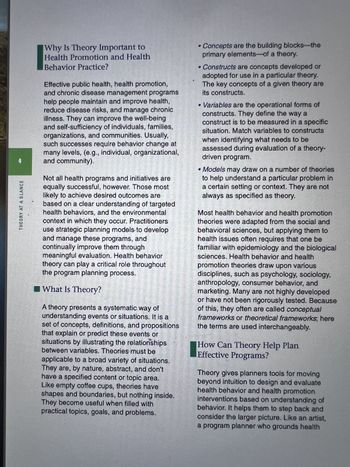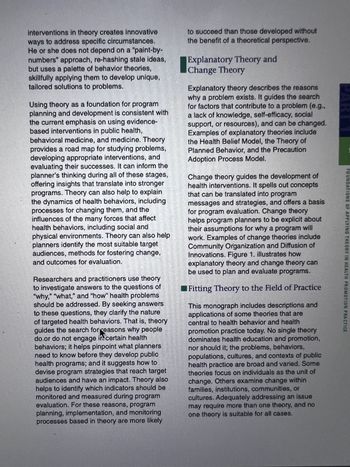
Ciccarelli: Psychology_5 (5th Edition)
5th Edition
ISBN: 9780134477961
Author: Saundra K. Ciccarelli, J. Noland White
Publisher: PEARSON
expand_more
expand_more
format_list_bulleted
Question
give me 5 key takeaway in these reading.

Transcribed Image Text:THEORY AT A GLANCE
Why Is Theory Important to
Health Promotion and Health
Behavior Practice?
Effective public health, health promotion,
and chronic disease management programs
help people maintain and improve health,
reduce disease risks, and manage chronic
illness. They can improve the well-being
and self-sufficiency of individuals, families,
organizations, and communities. Usually,
such successes require behavior change at
many levels, (e.g., individual, organizational,
and community).
Not all health programs and initiatives are
equally successful, however. Those most
likely to achieve desired outcomes are
based on a clear understanding of targeted
health behaviors, and the environmental
context in which they occur. Practitioners
use strategic planning models to develop
and manage these programs, and
continually improve them through
meaningful evaluation. Health behavior
theory can play a critical role throughout
the program planning process.
What Is Theory?
A theory presents a systematic way of
understanding events or situations. It is a
set of concepts, definitions, and propositions
that explain or predict these events or
situations by illustrating the relationships
between variables. Theories must be
applicable to a broad variety of situations.
They are, by nature, abstract, and don't
have a specified content or topic area.
Like empty coffee cups, theories have
shapes and boundaries, but nothing inside.
They become useful when filled with
practical topics, goals, and problems.
• Concepts are the building blocks-the
primary elements of a theory.
•Constructs are concepts developed or
adopted for use in a particular theory.
The key concepts of a given theory are
its constructs.
• Variables are the operational forms of
constructs. They define the way a
construct is to be measured in a specific
situation. Match variables to constructs
when identifying what needs to be
assessed during evaluation of a theory-
driven program.
Models may draw on a number of theories
to help understand a particular problem in
a certain setting or context. They are not
always as specified as theory.
Most health behavior and health promotion
theories were adapted from the social and
behavioral sciences, but applying them to
health issues often requires that one be
familiar with epidemiology and the biological
sciences. Health behavior and health
promotion theories draw upon various
disciplines, such as psychology, sociology,
anthropology, consumer behavior, and
marketing. Many are not highly developed
or have not been rigorously tested. Because
of this, they often are called conceptual
frameworks or theoretical frameworks; here
the terms are used interchangeably.
How Can Theory Help Plan
Effective Programs?
Theory gives planners tools for moving
beyond intuition to design and evaluate
health behavior and health promotion
interventions based on understanding of
behavior. It helps them to step back and
consider the larger picture. Like an artist,
a program planner who grounds health

Transcribed Image Text:FOUNDATIONS OF APPLYING THEORY IN HEALTH PROMOTION PRACTICE
interventions in theory creates innovative
ways to address specific circumstances.
He or she does not depend on a "paint-by-
numbers" approach, re-hashing stale ideas,
but uses a palette of behavior theories,
skillfully applying them to develop unique,
tailored solutions to problems.
Using theory as a foundation for program
planning and development is consistent with
the current emphasis on using evidence-
based interventions in public health,
behavioral medicine, and medicine. Theory
provides a road map for studying problems,
developing appropriate interventions, and
evaluating their successes. It can inform the
planner's thinking during all of these stages,
offering insights that translate into stronger
programs. Theory can also help to explain
the dynamics of health behaviors, including
processes for changing them, and the
influences of the many forces that affect
health behaviors, including social and
physical environments. Theory can also help
planners identify the most suitable target
audiences, methods for fostering change,
and outcomes for evaluation.
Researchers and practitioners use theory
to investigate answers to the questions of
"why," "what," and "how" health problems
should be addressed. By seeking answers
to these questions, they clarify the nature
of targeted health behaviors. That is, theory
guides the search for reasons why people
do.or do not engage in certain health
behaviors; it helps pinpoint what planners
need to know before they develop public
health programs; and it suggests how to
devise program strategies that reach target
audiences and have an impact. Theory also
helps to identify which indicators should be
monitored and measured during program
evaluation. For these reasons, program
planning, implementation, and monitoring
processes based in theory are more likely
to succeed than those developed without
the benefit of a theoretical perspective.
Explanatory Theory and
Change Theory
Explanatory theory describes the reasons
why a problem exists. It guides the search
for factors that contribute to a problem (e.g.,
a lack of knowledge, self-efficacy, social
support, or resources), and can be changed.
Examples of explanatory theories include
the Health Belief Model, the Theory of
Planned Behavior, and the Precaution
Adoption Process Model.
Change theory guides the development of
health interventions. It spells out concepts
that can be translated into program
messages and strategies, and offers a basis
for program evaluation. Change theory
helps program planners to be explicit about
their assumptions for why a program will
work. Examples of change theories include
Community Organization and Diffusion of
Innovations. Figure 1. illustrates how
explanatory theory and change theory can
be used to plan and evaluate programs.
Fitting Theory to the Field of Practice
This monograph includes descriptions and
applications of some theories that are
central to health behavior and health
promotion practice today. No single theory
dominates health education and promotion,
nor should it; the problems, behaviors,
populations, cultures, and contexts of public
health practice are broad and varied. Some
theories focus on individuals as the unit of
change. Others examine change within
families, institutions, communities, or
cultures. Adequately addressing an issue
may require more than one theory, and no
one theory is suitable for all cases.
Expert Solution
This question has been solved!
Explore an expertly crafted, step-by-step solution for a thorough understanding of key concepts.
Step by stepSolved in 2 steps

Knowledge Booster
Recommended textbooks for you
 Ciccarelli: Psychology_5 (5th Edition)PsychologyISBN:9780134477961Author:Saundra K. Ciccarelli, J. Noland WhitePublisher:PEARSON
Ciccarelli: Psychology_5 (5th Edition)PsychologyISBN:9780134477961Author:Saundra K. Ciccarelli, J. Noland WhitePublisher:PEARSON Cognitive PsychologyPsychologyISBN:9781337408271Author:Goldstein, E. Bruce.Publisher:Cengage Learning,
Cognitive PsychologyPsychologyISBN:9781337408271Author:Goldstein, E. Bruce.Publisher:Cengage Learning, Introduction to Psychology: Gateways to Mind and ...PsychologyISBN:9781337565691Author:Dennis Coon, John O. Mitterer, Tanya S. MartiniPublisher:Cengage Learning
Introduction to Psychology: Gateways to Mind and ...PsychologyISBN:9781337565691Author:Dennis Coon, John O. Mitterer, Tanya S. MartiniPublisher:Cengage Learning Psychology in Your Life (Second Edition)PsychologyISBN:9780393265156Author:Sarah Grison, Michael GazzanigaPublisher:W. W. Norton & Company
Psychology in Your Life (Second Edition)PsychologyISBN:9780393265156Author:Sarah Grison, Michael GazzanigaPublisher:W. W. Norton & Company Cognitive Psychology: Connecting Mind, Research a...PsychologyISBN:9781285763880Author:E. Bruce GoldsteinPublisher:Cengage Learning
Cognitive Psychology: Connecting Mind, Research a...PsychologyISBN:9781285763880Author:E. Bruce GoldsteinPublisher:Cengage Learning Theories of Personality (MindTap Course List)PsychologyISBN:9781305652958Author:Duane P. Schultz, Sydney Ellen SchultzPublisher:Cengage Learning
Theories of Personality (MindTap Course List)PsychologyISBN:9781305652958Author:Duane P. Schultz, Sydney Ellen SchultzPublisher:Cengage Learning

Ciccarelli: Psychology_5 (5th Edition)
Psychology
ISBN:9780134477961
Author:Saundra K. Ciccarelli, J. Noland White
Publisher:PEARSON

Cognitive Psychology
Psychology
ISBN:9781337408271
Author:Goldstein, E. Bruce.
Publisher:Cengage Learning,

Introduction to Psychology: Gateways to Mind and ...
Psychology
ISBN:9781337565691
Author:Dennis Coon, John O. Mitterer, Tanya S. Martini
Publisher:Cengage Learning

Psychology in Your Life (Second Edition)
Psychology
ISBN:9780393265156
Author:Sarah Grison, Michael Gazzaniga
Publisher:W. W. Norton & Company

Cognitive Psychology: Connecting Mind, Research a...
Psychology
ISBN:9781285763880
Author:E. Bruce Goldstein
Publisher:Cengage Learning

Theories of Personality (MindTap Course List)
Psychology
ISBN:9781305652958
Author:Duane P. Schultz, Sydney Ellen Schultz
Publisher:Cengage Learning